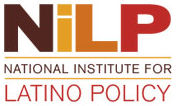 The Puerto Rican Connection to the Immigrant Rights Movement
The Puerto Rican Connection to the Immigrant Rights Movement
By Angelo Falcón
 One of the major developments that Latinos and the country as a whole will remember for some time is the controversy over the adoption of the anti-immigrant bill by the state of Arizona, AB 1070. While similar legislation had been adopted or contemplated throughout the country at the state and local levels, the Arizona legislation encapsulated more than anything else the rising nativism in the United States and the consequences of the failure by the federal government to adopt comprehensive immigration reform. Puerto Ricans, who in contrast to other Latinos enter the United States as US citizens, have been affected by this rising anti-immigrant sentiment despite technically not being "immigrants." Some, in fact, have argued that Puerto Ricans, as US citizens, might join in on this nativist movement.
One of the major developments that Latinos and the country as a whole will remember for some time is the controversy over the adoption of the anti-immigrant bill by the state of Arizona, AB 1070. While similar legislation had been adopted or contemplated throughout the country at the state and local levels, the Arizona legislation encapsulated more than anything else the rising nativism in the United States and the consequences of the failure by the federal government to adopt comprehensive immigration reform. Puerto Ricans, who in contrast to other Latinos enter the United States as US citizens, have been affected by this rising anti-immigrant sentiment despite technically not being "immigrants." Some, in fact, have argued that Puerto Ricans, as US citizens, might join in on this nativist movement.
But certain unique factors in the history and circumstances of the Puerto Rican experiences have resulted in a more complex relationship of this community to the immigrant rights struggle. While at the street level there is considerable anti-immigrant sentiment in Puerto Ricans communities stateside and in Puerto Rico, this sentiment has not risen to the political level. On the contrary, and to the surprise of many, Puerto Rican political and community leaders and activists have become one of the progressive forces in the movement to defend immigrant rights and the advocacy of comprehensive immigration reform.

In the United States Congress, it is clear that the most progressive positions on immigration, even more so that the Mexican-American members, have consistently been taken by the three Puerto Ricans members of that body: Luis Gutierrez of Chicago, and José Serrano and Nydia Velasquez of New York. Gutierrez, in fact, has emerged as the most high profile advocate of comprehensive immigration reform, tirelessly speaking out on this issue and becoming an outspoken critic of the Republican opposition to this reform and even of the Obama Administration's lack of movement on this issue.
Puerto Rican community, faith-based and labor organizations have been leaders in the struggle to protect immigrant rights and promote federal legislation that would create a path to citizenship for the undocumented. The Puerto Rican Legal Defense and Education Fund (now renamed LatinoJustice PRLDEF) was among the first to take on the rise of local anti-immigrant ordinances when they, along with the ACLU and others, successfully legally challenged the town of Hazelton, Pennsylvania. Hector Figueroa, Secretary-Treasurer of Local 32BJ SEIU, and Sonia Ivany, head of the New York Chapter of the Labor Council for Latin American Advancement, both Puerto Rican, have been important labor leaders, among many others, promoting progressive immigration reform. Samuel Rodriguez of the National Hispanic Christian Leadership Conference, Luis Cortez of Esperanza in Philadelphia, and Miguel Rivera of CONLAMIC, all Puerto Rican, have been major players in the immigration rights movement.
The Puerto Rican experience also presents an interesting challenge to this immigrant rights movement as well. The holy grail of this movement is the notion that the acquisition of US citizenship and the benefits it will bring to those who attain it in terms of their integration into American society. However, despite being US citizens since 1917, Puerto Ricans still find themselves disproportionate mired in higher poverty rates than other American citizens, both stateside and even more so in Puerto Rico. This does not negate the importance of US citizenship but underscores that it is not a magic bullet and that the realities of being Latino in America are more complicated and challenging.
In fighting for their own rights as a community, Puerto Ricans have helped to shape policies and practices in the United States that have opened opportunities for new Latino and other immigrants. From language policies and programs like bilingual education, voting rights, affirmative action and many other areas, Puerto Ricans have been pioneers in ways that have made the conditions of Dominicans, Mexicans, Colombians, Ecuadorans and others more supportive. This is a role that Puerto Ricans have played historically that perhaps needs to be more frequently acknowledged.
At first glance, Puerto Ricans and immigration reform may not seem to have much to do with one another. But the unique history and experiences of the Puerto Rican people have, as it has in many other instances, defied the conventional wisdom to the benefit of all of the American people. When opponents of the anti-immigrant Arizona law point out that "We are all Arizona," this definitely includes the Puerto Rican community.
Angelo Falcón, a political scientist, is President of the National Institute for Latino Policy (NiLP) (formerly the Institute for Puerto Rican Policy). He is co-editor of the book, "Boricuas in Gotham: Puerto Ricans in the Making of Modern New York City." He is a resident of "Los Sures" section of Williamsburg, Brooklyn.
